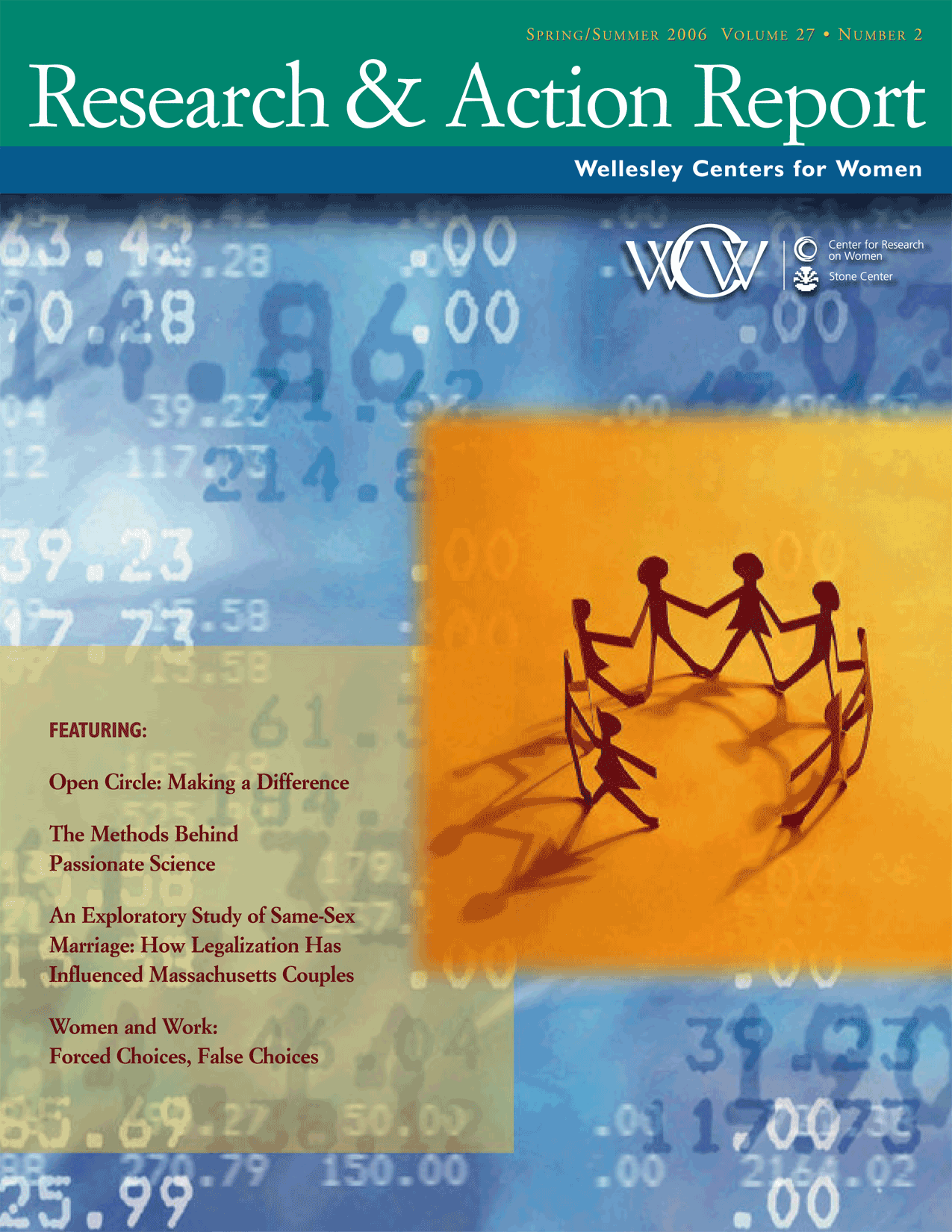Research & Action Report Spring/Summer 2006
More than 200 advocates, researchers, and grassroots organizers convened at the New York County Lawyer’s Association (NYCLA) on March 4, 2006 for “Violence against Women: From Critical Concerns to Collective Action,” a one-day conference that coincided with the United Nations Commission on the Status of Women (CSW) Fiftieth Session. The conference, co-sponsored by the Wellesley Centers for Women (WCW) and the NYCLA, was part of a two-year advocacy effort of the NGO (Non-Governmental Organization) Committee on the Status of Women, NY.The program provided an opportunity for CSW attendees to learn about current efforts to coordinate NGO advocacy in various areas of violence against women. The program featured international experts who addressed research, media influence, and legal impunity related to this global concern and was designed to galvanize action among researchers, grassroots activists, and policy makers as well as to bring visibility to the issues.
WCW organized “Searching for the Roots of Violence: the Research Paradigm,” a panel which offered an academic perspective on addressing research, statistical data, data collection, and other concerns around the issue of violence against women. Moderated by Susan Bailey, executive director of WCW who asked, “How can research help get to the root cause of the problems?”, the panel featured Yakin Ertürk, United Nations special rapporteur on violence against women; Charlotte Bunch, founder and executive director of the Center for Women's Global Leadership at Douglass College, Rutgers, the State University of New Jersey; and Sealing Cheng, Henry Luce assistant professor in the Women’s Studies Department at Wellesley College.
“I find incredible achievement in the past ten to 12 years. I think we should not be so discontented with what’s going on because it’s a new
mandate,” reported Ertürk, pointing out that the issues such as shame and violence known as “honor crimes” are open to more public discussion and are accepted more broadly as human rights issues. “We need to build upon this visibility and achievement. Violence against women is about women’s empowerment, not victimization,” she stated, encouraging attendees to look at this critical issue from a wider perspective and to not fragment agendas. “We should be empowered.”
According to panelist Bunch, research plays an important role in shaping policies to address violence against women. But, she cautions, “We have very little good research on what works, what doesn’t work and why. We need to be clear what works best and we need to bring creativity to the agenda.” Bunch emphasized the need to understand all aspects of the issues by addressing traditional and contemporary challenges if research is to effectively influence policy. Cheng furthered this argument and shared examples of research on trafficking by NGOs in Korea. She cited important policy implications that can come from evidence presented in the form of such collected data.
The day’s program began with welcoming remarks by representatives of the host organization, followed by the morning address, “Looking at the issues,” a review of statistics on global violence against women presented by Lois A. Herman, coordinator of the Women's UN Report Network. A second panel, “Shaping Society: Using Media Exposure,” focused on the media’s role in exposing the forms of violence against women and how the media is helping to bring attention to these issues. Sponsored by the NGO CSW NY, this panel featured Rita Henley-Jensen, founder and editor in chief, Women’s eNews; Ki Mae Heussner, public affairs manager, LifetimeTV; Zoe Neirizi, writer, director and producer of The Corridor, 2004; and Sue Conde, Vice President, UNIFEM Australia speaking for the National Leadership Group for White Ribbon Day.
Christine Brautigam, Chief, Women’s Rights Unit, Division for the Advancement of Women, UN DESA, provided an overview of the UN Secretary General’s Study on Violence Against Women before participants broke into workshops to begin drafting position papers to present the perspectives of those attending the conference.
“Legal Impunity: The Rule of Law, Administration of Justice and Legal Enforcement,” the final panel, addressed the deterrents to violence against women, how rules of law can be imposed to stop this violence, and what needs to be done beyond the law to enforce a no-tolerance policy. Speakers included: Denise Scotto, Esq., attorney-at-law & policy advisor; Janet Benshoof, Esq., president, Global Justice Center; Penelope Andrews, professor, CUNY School of Law at Queens College, the City University of New York; and Simone Monasebian, Esq., representative & chief of the NY Office, UN Office of Drugs & Crime.
Closing remarks were offered by Noeleen Heyzer, executive director, UNIFEM, and next step recommendations were outlined by Leslie Wright, Chair, sub-committee on Violence against Women; and Denise Scotto, vice chair, NGO CSW NY.
Tags:


